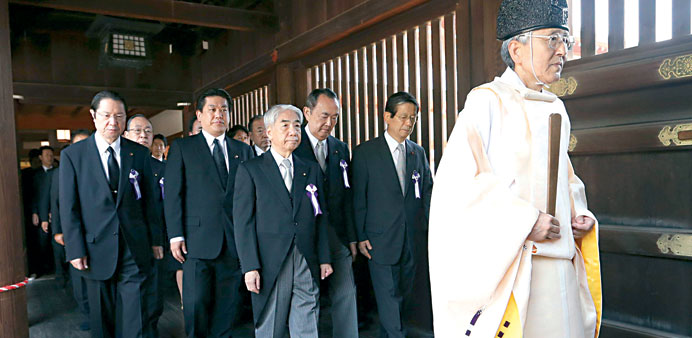A group of lawmakers, including ruling Liberal Democratic Party (LDP) lawmaker Hidehisa Otsuji (third left) and Japan Restoration Party member Takeo Hiranuma (second right) are led by a Shinto priest as they visit the Yasukuni Shrine in Tokyo yesterday on the anniversary of Japan’s surrender in World War II.
AFP/Tokyo
Japan’s conservative prime minister yesterday broke with two decades of tradition by omitting any expression of remorse for Tokyo’s past aggression in Asia on the anniversary of its World War II surrender.
Shinzo Abe’s speech avoided words such as “profound remorse” and “sincere mourning” used by his predecessors to acknowledge the suffering caused by the Imperial Japanese Army as it stormed across East Asia - an omission sure to anger China and South Korea.
The hawkish premier has previously expressed unease over Japan’s apologies for wartime aggression. The country’s neighbours have also bristled at Abe’s talk of overhauling the pacifist constitution.
Seoul and Beijing lashed out yesterday when nearly 100 Japanese lawmakers, including three cabinet ministers, visited a controversial war shrine in Tokyo throughout the day.
The leafy site in the heart of the capital is seen overseas as a glorification of Japan’s imperialist past, including a brutal 35-year occupation of the Korean peninsula.
In response, China summoned Japan’s envoy yesterday, saying it was “strongly opposed and strictly condemned” the shrine visits. It warned relations had “no future” unless Tokyo owned up to its past.
South Korea’s foreign ministry blasted Tokyo for “turning a blind eye” to its violent aggression during the first half of the 20th century.
And President Park Geun-Hye said it was “hard to build trust without the willingness to face history and consider the wounds inflicted upon others” as she marked the peninsula’s liberation from Japan.
The comments did not directly address the speech by Japan’s leader, who also dropped a reference in the annual speech to uphold Tokyo’s pledge not to wage war.
Abe stayed away from the shrine yesterday but he sent a ritual offering via an aide. “I will never forget the fact that the peace and prosperity we are enjoying now was built based on the sacrifice of your precious lives,” the prime minister said in a reference to the 2.5mn war dead honoured at the shrine.
Abe declined to say whether he would visit Yasukuni during his current term, although he has repeatedly said he deeply regretted his decision not to visit the shrine during his first stint as premier in 2006-2007.
“I want to refrain from discussing whether or not I would visit the Yasukuni shrine out of concern that it could turn into a political and diplomatic issue,” he told reporters.
Yasukuni enshrines citizens who died in World War II and other conflicts, but the names include 14 top convicted war criminals such as General Hideki Tojo, who authorised the attack on Pearl Harbour that drew the US into the war.
Japan surrendered on August 15, 1945 after the US dropped atomic bombs on the cities of Hiroshima and Nagasaki.
Security was tight yesterday with hundreds of police surrounding the shrine as right-wing nationalists carried flags calling on visitors to pray for Japan’s “heroic war dead”.
Police blocked a small group of visiting South Korean lawmakers from erecting an anti-Abe banner over fears of a clash.
“Consoling the souls of war dead is a purely domestic issue,” one minister who visited Yasukuni, Keiji Furuya, told reporters. “This is not something that other countries are supposed to criticise or interfere with.”
Yoshitaka Shindo, internal affairs and communications minister, called his visit “a personal decision”.
The shrine also ignited tensions in April when nearly 170 lawmakers visited for a spring festival, grabbing international headlines and stoking regional tension.
For many, a stroll down Yasukuni’s stone paths lined with cherry trees and past imposing gates dedicated to Shinto - Japan’s animist religion - is a non-political ritual.
“My father held me only once before heading to the war zone, knowing Japan would lose,” said 69-year-old Sumiko Iida. “I’m absolutely against wars.”
But one 73-year-old man whose father is enshrined at Yasukuni took heart from Abe’s comments yesterday. “We’ve apologised too much,” Shigenobu Hashiguchi, 73, told AFP.
“It’s absurd for foreigners to think that Japan will return to its past imperialist military aggression. We should still pray for the war dead regardless of whatever China and South Korea say.”
But there is a significant amount of domestic opposition to Yasukuni, including among some relatives of those honoured there. They say it glorifies war and the darker chapters in Japan’s history.
The latest tensions come as Tokyo remains locked in bitter territorial disputes with South Korea and China. Ties with Beijing have been all but frozen after maritime skirmishes over a set of East China Sea islands claimed by both countries.

